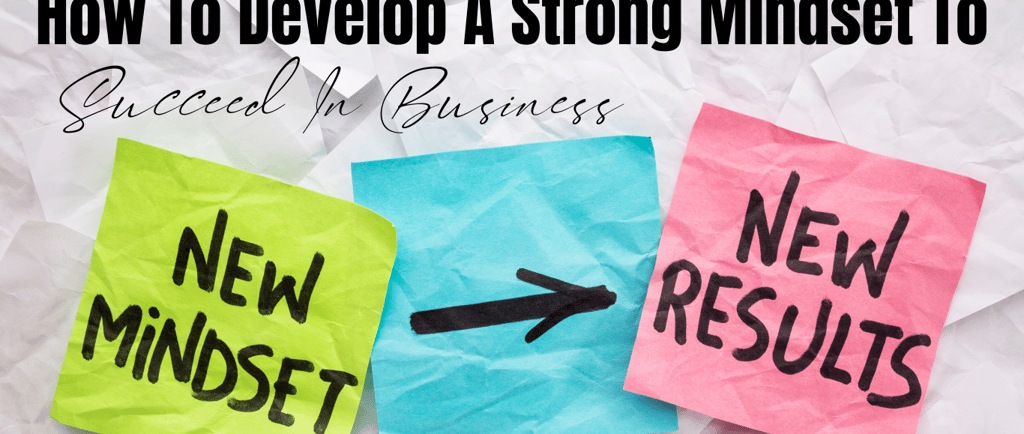Building Mental Toughness: The Key to Success in Business
Success in business isn’t just about having the best ideas or the most funding — it’s about having the right mindset. Entrepreneurship is a test of resilience, patience, and adaptability. It’s a journey filled with highs and lows, and only those with a tough mindset can weather the storms and come out stronger. Let’s break down exactly how to develop the mental toughness you need to thrive in business. Whether you’re just starting out or looking to push past obstacles in your entrepreneurial journey, these strategies will help you build the resilience necessary to succeed.
MASTERING YOUR MINDSET
3/10/20255 min read


Understanding the Importance of Mindset in Business
In the realm of entrepreneurship, possessing a strong mindset is often regarded as a pivotal factor that influences overall success. Contrary to common misconceptions that equate success solely with external factors such as funding, location, or market trends, the role of an entrepreneur's mindset cannot be overstated. A resilient mindset has the power to transform challenges into opportunities, enabling individuals to navigate the complexities of the business landscape effectively.
Resilience is crucial for entrepreneurs, particularly in an environment punctuated by uncertainty and rapid change. An individual with a resilient mindset can rebound from setbacks while viewing failures not as definitive ends but as valuable learning experiences. This resilience fosters patience—an essential quality in business where immediate success is rarely guaranteed. Recognizing that significant achievements require time and effort encourages entrepreneurs to stay committed to their goals, even when progress appears slow.
Another key element of a strong entrepreneurial mindset is adaptability. The ability to pivot in response to unforeseen challenges or evolving market dynamics is indispensable. Entrepreneurs equipped with this flexibility are more likely to find innovative solutions and adapt their strategies, thereby increasing their chances of success in a competitive environment. Furthermore, cultivating a positive mental attitude plays a significant role in sustaining motivation and focus amidst the inevitable turbulence faced in any business journey.
Ultimately, the mindset of an entrepreneur shapes their reaction to challenges encountered along their path. By developing a robust intellectual framework characterized by resilience, patience, and adaptability, business leaders can enhance their problem-solving capacities and lead their enterprises more effectively. Emphasizing the importance of mindset is crucial for anyone looking to thrive in the demanding world of entrepreneurship, underscoring its role as a foundational element for long-term success.
Identifying the Traits of a Resilient Entrepreneur
Resilience is a fundamental quality that distinguishes successful entrepreneurs from their peers. One of the key traits of a resilient entrepreneur is emotional intelligence, which encompasses the ability to recognize, understand, and manage one's own emotions, as well as empathize with others. This skill enables entrepreneurs to navigate the complexities of interpersonal relationships, fostering effective communication and collaboration. By understanding emotional cues, resilient entrepreneurs can make informed decisions, even in high-pressure situations.
Another critical trait is perseverance, the unwavering commitment to continue despite obstacles and setbacks. Entrepreneurs face numerous challenges, from financial difficulties to market competition. Those who exhibit perseverance are more likely to persist in their endeavors, adapt their strategies, and ultimately achieve their business goals. This steadfastness often inspires their teams and stakeholders, creating an environment where resilience is cultivated across the organization.
Adaptability is also vital for resilient entrepreneurs. The business landscape is constantly evolving, and those who can pivot quickly in response to market changes are better positioned for long-term success. Entrepreneurs who embrace change and view challenges as opportunities for growth demonstrate a flexibility that can lead to innovative solutions. This willingness to adapt allows them to stay relevant and competitive.
A growth mindset further enriches an entrepreneur's resilience. This concept, championed by psychologist Carol Dweck, encourages individuals to view failures as learning experiences rather than permanent setbacks. Entrepreneurs with a growth mindset actively seek feedback and view challenges as opportunities to expand their skills and knowledge. This approach not only enhances personal development but also fosters a culture of continuous improvement within their organizations.
Finally, self-awareness plays an essential role in resilience. Entrepreneurs who can identify their strengths and weaknesses are equipped to leverage their capabilities while addressing areas for improvement. This level of self-awareness allows them to create strategies that align with their personal attributes, ultimately contributing to sustainable success. By cultivating emotional intelligence, perseverance, adaptability, and a growth mindset, entrepreneurs can build the mental toughness necessary to thrive in the ever-changing business environment.
Strategies for Developing Mental Toughness
Developing mental toughness is essential for entrepreneurs aiming for sustained success in business. Below are practical strategies designed to enhance your resilience and foster an environment conducive to growth and achievement.
Firstly, setting realistic goals is paramount. While high aspirations can be motivating, overly ambitious objectives may lead to frustration if not met. Break larger goals into smaller, achievable milestones that allow for gradual progress. This way, you create a framework that fosters confidence and a sense of accomplishment as you meet each target. For instance, if you're launching a new product, rather than focusing solely on sales figures, aim to complete market research within a specific timeline, followed by the launch, and finally, sales milestones. Each step will bolster your resolve.
Maintaining a healthy work-life balance is another critical aspect. Entrepreneurs often become engrossed in their ventures, which can lead to burnout. Incorporate regular breaks and schedule time for relaxation and hobbies outside of work. This can have remarkable effects on your mental state, enhancing creativity and focus when you return to your tasks. Consider employing strategies like the Pomodoro Technique, where you work intensely for a set period, followed by a short break to recharge.
Incorporating mindfulness and stress management techniques is vital as well. Practices such as meditation and deep-breathing exercises can help in calming the mind and reducing anxiety. Dedicating just a few minutes daily to these exercises can cultivate a stronger mental foundation during challenging situations. For example, before significant meetings or decisions, take a moment to center yourself, which can lead to better clarity and judgment.
Lastly, seeking mentorship and support greatly contributes to developing mental toughness. Engage with experienced individuals in your field who can provide insights and encouragement. Join entrepreneurial support groups or networks where sharing challenges and successes can foster resilience among peers. Collaboration and guidance can make the journey easier and more enriching.
By implementing these strategies—goal setting, work-life balance, mindfulness, and mentorship—entrepreneurs can bolster their mental toughness, significantly impacting their overall success.
Overcoming Obstacles: Real-Life Examples of Resilient Entrepreneurs
Entrepreneurship often involves navigating a complex landscape filled with challenges and uncertainties. Mental toughness plays a crucial role in overcoming these obstacles, as demonstrated by the journeys of several prominent entrepreneurs. One notable example is Howard Schultz, the former CEO of Starbucks. Schultz grew up in a poor neighborhood in Brooklyn, New York, facing financial hardships during his youth. Undeterred by his circumstances, he pursued a vision of bringing quality coffee to the masses. His determination faced a significant hurdle when he sought to transform Starbucks from a small chain to a global brand. Many investors were skeptical, but Schultz's unwavering belief in his mission and commitment to quality eventually led to the company’s immense success.
Another exemplary figure is Sara Blakely, the founder of Spanx. Blakely faced numerous rejections while trying to market her innovative shapewear idea. Instead of succumbing to disappointment, she leveraged her resilience to refine her pitch and learn from feedback. With little financial backing, she persevered, working tirelessly to promote her product and establish a brand synonymous with empowerment and body positivity. Today, Spanx is a household name, and Blakely's journey emphasizes that mental fortitude is pivotal in turning ideas into profitable ventures.
Lastly, consider Elon Musk, known for his ventures like Tesla and SpaceX. Musk's entrepreneurial path was marked by several high-stakes failures, including the near-collapse of Tesla in its early days. Despite facing overwhelming odds, including public skepticism and financial tribulations, Musk's mental resilience fueled his relentless drive to innovate within the automotive and space industries. His experiences highlight that overcoming obstacles is integral to achieving groundbreaking success in business.
These stories reflect a common thread: the powerful impact of mental toughness. Entrepreneurs like Schultz, Blakely, and Musk have demonstrated that resilience not only equips individuals to withstand adversity but also propels them toward remarkable achievements, proving that determination can lead to triumph in the face of hardship.
